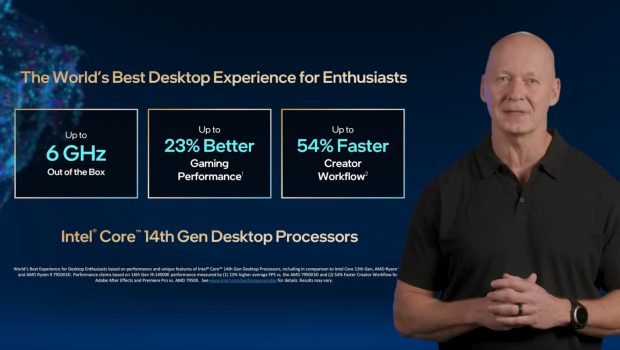IEM Sydney 2023 Interview: Intel’s Roger Chandler on Intel Core 14th Gen Gaming Performance
ImpulseGamer recently attended IEM Sydney 2023 and had the opportunity to sit down and talk with Intel’s Roger Chandler for a briefing about the newly launched 14th Gen CPU debut and its new features. Here’s how Intel is uplifting game performance with its Raptor Lake-S Refresh product line.
Intel’s 14th Generation desktop processors are officially out now, and with the promise of more efficient cores, higher clock speeds, and “up to 23% gaming performance uplift” against its competitors – which the ImpulseGamer team put to the test in our Intel Core i9 14900K and i5 14600K reviews.
The 2023 Raptor Lake-S Refresh consists of three new desktop processors (and KF variants) delivering up to 24 cores, 32 threads and, in the case of the flagship Core i9 14900K, touted to be the world’s fastest desktop processor, up to 6 GHz (clock rate) right out-of-the-box.
But the 14th Gen isn’t just more cores and better boost speeds, according to Intel; it’s also accompanied by new exclusive tech and an increased focus on enthusiast gamers, overclockers and creators alike.
“We’ve designed 14th Gen for enthusiasts, first and foremost,” Roger Chandler, VP and General Manager, Creator PC and Workstation Solutions in Intel’s Client Computing Group, explains. “When you look at modern gamers, they do more than just play the game – they stream, record, create. It really takes a proper mix of both performance and parallel processing across multiple cores, as well as the overall platform itself coming together, to accommodate their needs today.”
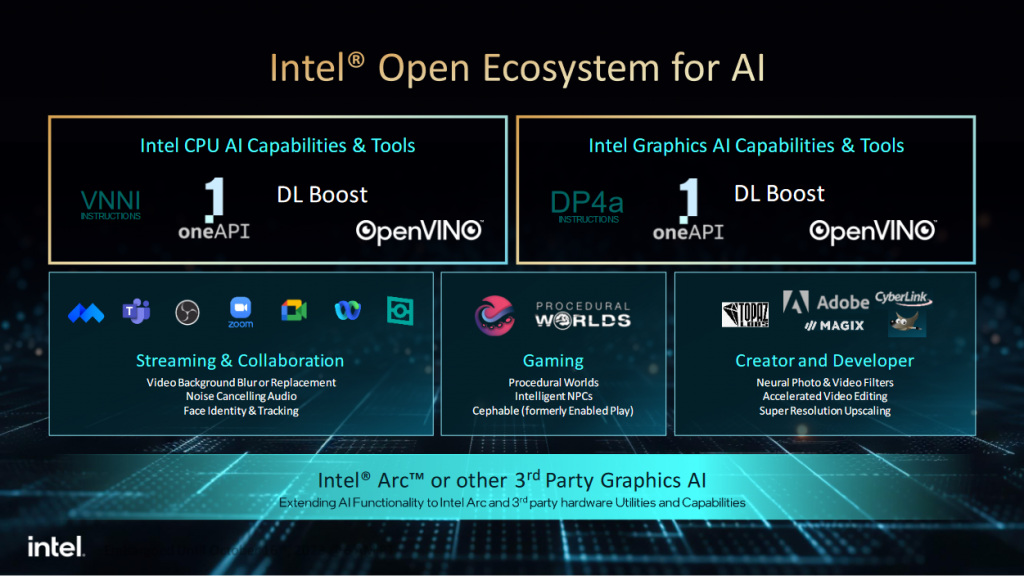
Intel is positioning its AI capabilities as a big part of the 14th Gen platform experience. Source: Intel
One way they do this is in Intel’s Application Performance Optimization (APO), a new feature that determines and directs application resources in real-time, directing resources to the right core. According to Roger, this Intel 7 process is one they’ve refined and are rolling out at scale.
“APO is a new policy we’ve integrated into our dynamic tuning tool and thread director that actually allows application-specific performance enhancements. We’ve already applied APO to specific games and seen double-digit performance boosts, and we expect to expand upon the list of game apps with this capability over-time.”
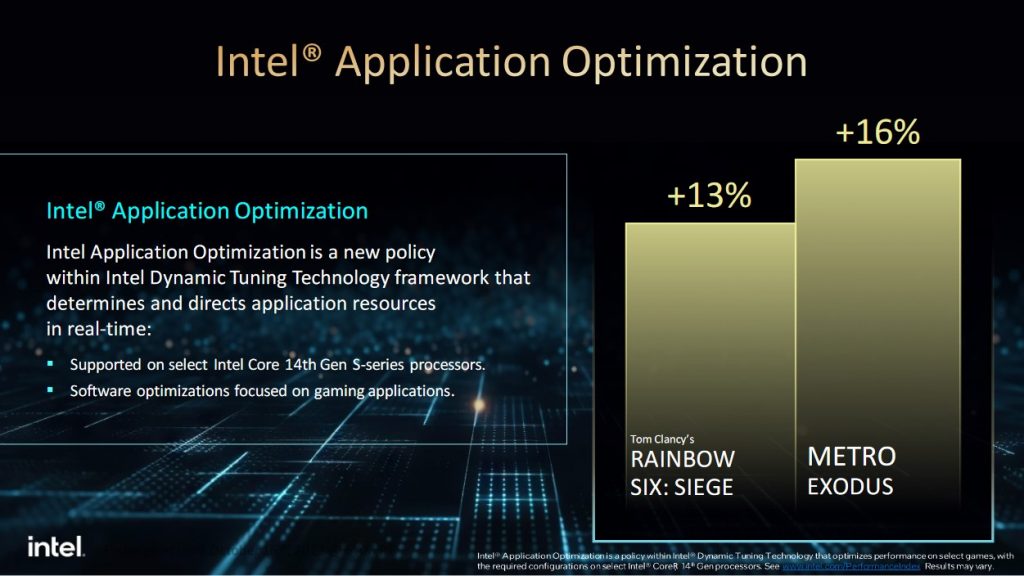
Examples of improved gaming performance on 14th Gen using Intel APO. Source: Intel
“If you’re familiar with our hybrid core architecture, there’s our high-performance cores, our efficiency cores, and our Thread Director capabilities, great for background tasks and multi-tasking to distribute workloads across your platform and ensure the right thread is going to the right core,” Roger explains. “We’ve evolved that in 14th Gen, and discovered there’s an opportunity to cater to the different types of workloads – gamer, creator, overclocker – and how to start creating policies at that level. We found at the application-specific level, there’s a lot more tuning we could do.”
“The way APO works is there’s a list of applications Intel identifies to implement this new policy and apply it for that particular game and we give the users the opportunity to turn that on or off – the reason we do that is software is very dynamic,” Roger says. “Users could get a great performance bump with APO, but the game studio might put out an update that improves things better. We want to give users more boosts and more options, but never lock-in.”
Another brand new 14th Gen feature is in Intel’s Extreme Tuning Utility (XTU) overclocking tool. Called AI Assist, it brings one-click AI-guided overclocking exclusive to users with the 14900K/KF installed – with expanded support for other 14th Gen CPUs is expected to come later.

XTU’s AI Assist Feature in action.
“If you’re willing to meet the demand of overclockers, you’re doing something right,” Roger affirms. “We pride ourselves in the features we provide to overclockers and feel this is a very vocal part of the market; they want capabilities and accessibility to their hardware and deep insights to what’s happening with the platform, and to set world records. So we’re offering a number of new experiences and capabilities with the 14th Gen for overclockers specifically, like in XTU, where we’ve added this new feature called AI Assist, which gives much more precise insight about your individual hardware. It’s a fairly intuitive interface for folks who want to get their first step into overclocking in a way that’s pretty safe and controlled and is specific to their system. We see it as increasing the accessibility greatly for overclocking.”
According to Roger, content creators also informed many of the 14th Gen’s new upgrades. “We see so many folks logging millions of hours not just playing games, but watching content created by someone who played a game, which ramped up during COVID. With our Core i7-14700K/KF particularly, we’re offering 25% more cores as a sweet spot SKU that’s high volume and one of our most vital products in the line. Offering this bump in performance is a really big deal for us.”
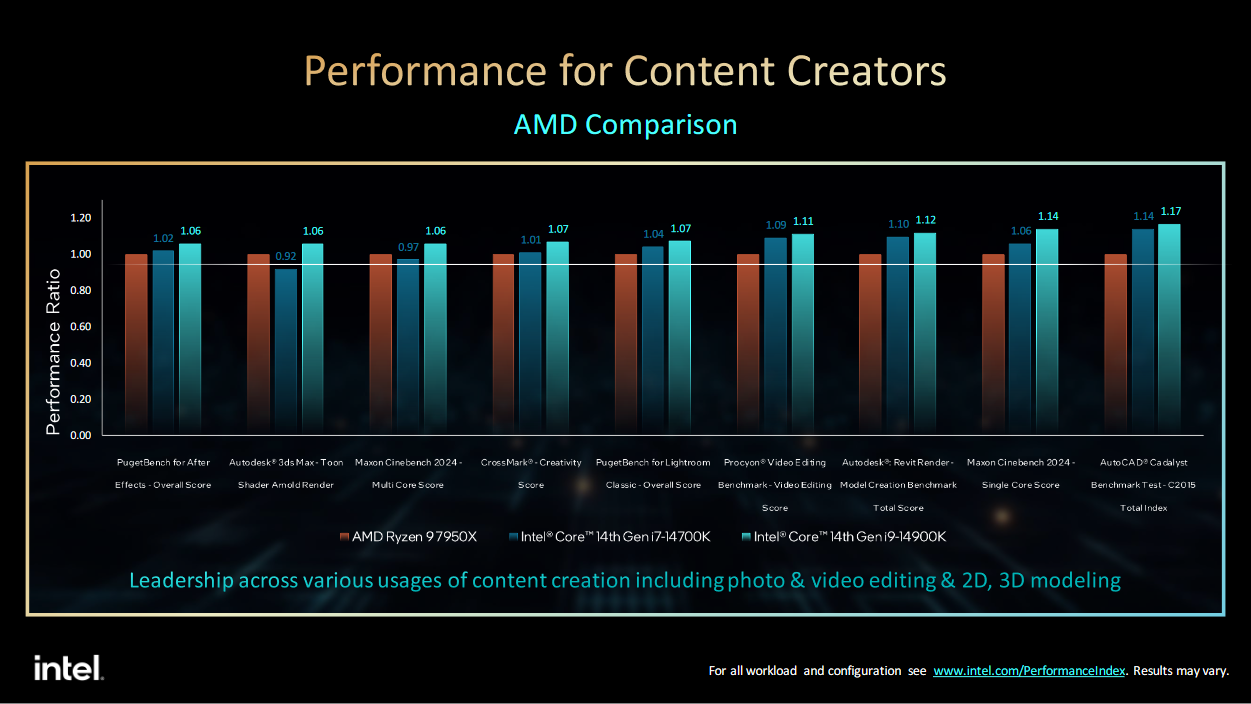
Intel 14th Gen CPUs vs AMD competition in content creation tasks. Source: Intel
One important factor in the move from 13th to 14th Gen highlighted during the launch briefing was compatibility, with the new product line fully compatible with Intel 600 and 700 chipsets. “Drop-in compatibility is a big deal because it’s a really easy upgrade process,” said Roger. Support for PCIe Gen 4 and 5.0, and DDR4 and DDR5 RAM is also part of this mantra. “This is all in addition to increasing the overclocking capabilities of our performance-heavy cores, higher DDR5 XMP speeds for memory overclocking, new per-core thermal throttling capabilities, and much more,” Roger confirms.
With video games becoming more complex in design and dense in content, the role of the CPU in modern gaming experiences has become increasingly highlighted, especially by gamers who want more out of immersive elements (physics, NPC density, AI) governed by CPU than GPU. One of my final questions was where Intel sees the 14th gen chips and beyond in driving this desired modern gaming experience. For Roger, it’s clear Intel wants to continuously do more in this space.
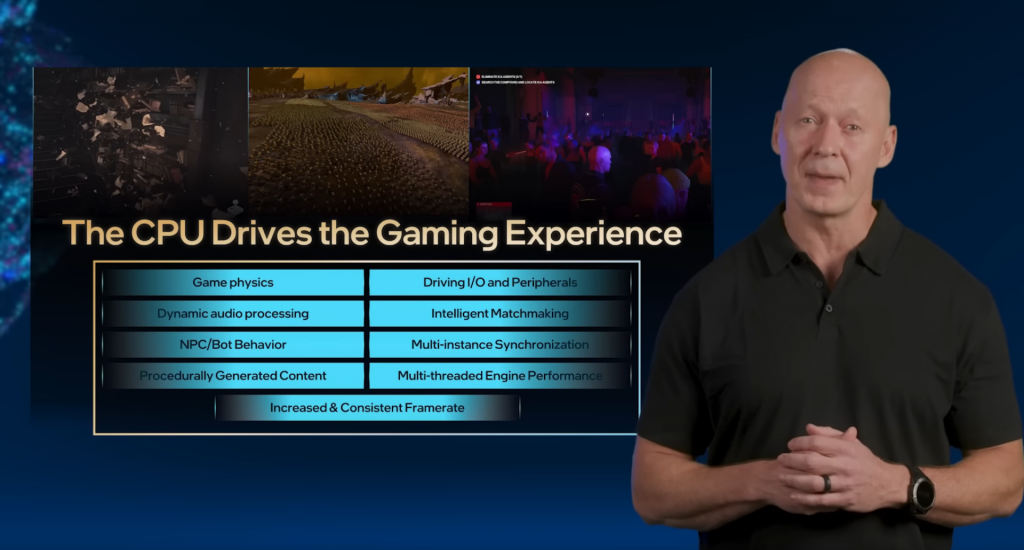
It’s all about the CPU in the gaming experience with Intel 14th Gen. Source: Intel
“I think the role of the CPU is actually really strong, we just could have done a better job in previous years in helping people understand it,” Roger says. “Without getting too technical, making sure people understand the CPU is a complete platform. 14th Gen is about what I would call the modern enthusiast gamer: They do more than just play an individual game, and care more about just raw frame-rate on an individual game. They ask, ‘How does your platform perform against a broad range of games? How does it perform when you’re gaming, but also streaming and recording? How does it behave when you’re starting to play experimental games that are much more physics-oriented, or when emerging AI workloads come on or you need to transfer a lot of data in and out?’ It’s a full platform perspective.”
“Ultimately, we just want to make sure that when we talk to gaming enthusiasts, it’s more than just a bar chart or frame-rates. With 14th Gen, there’s better frame consistency and several platform exclusive features – a product where if a user will say, ‘Actually, I want to do this too’, we’ve already met their needs with a complete platform,” Roger concludes.
Intel Core 14th Gen Desktop Processors are now available to purchase at retail outlets and via OEM partners, alongside the new Intel Arc A580 GPU. For more technical information, visit our official Intel Core i9 14900K and Intel Core i5 14600K review.


